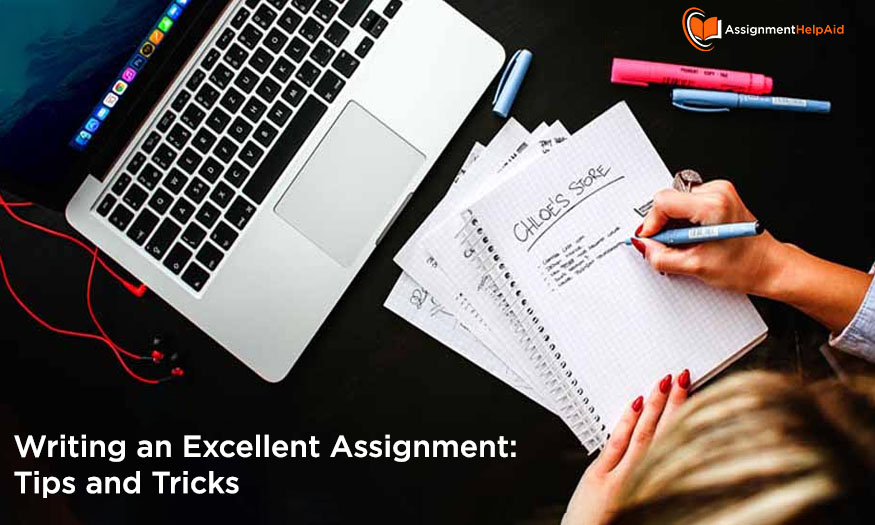
Writing an Excellent Assignment: Tips and Tricks
Writing assignments at the university level requires careful planning and attention to detail. It’s not just about meeting guidelines; it’s also about delivering high-quality work. Assignments serve as assessments of your critical thinking skills, evaluating your ability to analyze and discuss complex topics effectively. Moreover, your writing prowess is under scrutiny, with professors assessing your ability to produce polished and well-structured papers that meet academic standards.
How to Write Good Assignment
This blog is tailored for students aiming to enhance the quality of their assignments but are unsure of where to start. It delves into the essentials of creating standout assignments, offering insights on analyzing assignment topics, generating original ideas, formulating strong thesis statements, organizing content effectively, mastering referencing styles, presenting coherent arguments, and refining assignments for clarity and precision. Whether you’re a novice or a seasoned writer, this guide will equip you with the tools needed to excel in assignment writing. So, get ready to elevate your assignment game and master the art of academic writing.
Analyzing Assignments: A Step-by-Step Guide
Before delving into assignment writing, it’s crucial to thoroughly analyze the requirements. Missing key points could render your efforts futile. Therefore, a primary step in assignment writing is to scrutinize topic, task, and limiting words in the assignment topic. Let’s explore the significance of each in detail.
Elements in an Assignment Question
Topic Phrases/Words: Aid in identifying the concepts or ideas necessitating research
Task Phrases/Words: Directs the approach to take when crafting the assignment
Limiting Phrases/Words: Assist in recognizing the parameters of the assignment
Understanding Topic Words
Topic words are pivotal terms within the assignment prompt that signify the focal points requiring attention when crafting a university assignment. For instance, in the topic “The Role of Education in Preventing Domestic Abuse,” the crucial terms are “education” and “preventing domestic abuse.” These terms offer insights into the primary aspects to emphasize within your assignment.
Understanding Task Words
Task Words and Their Meanings:
Analyze: Students must consider all aspects of the topic, such as strengths, weaknesses, and limitations, and focus on how they connect.
Example: Analyze the role of factories in increasing water pollution.
Comment On: Requires students to state personal opinions on the topic and support their views with evidence.
Example: Comment on the dangers of climate change.
Compare and Contrast: Students highlight similarities and differences between subjects, ideas, or arguments while maintaining balance.
Example: Compare and contrast top social media platforms Instagram and X.
Critically Evaluate: Presents an objective overview of the topic and provides strong evidence to support claims.
Example: Critically evaluate the consequences of feminism on women’s empowerment in the workplace.
Describe: Focuses on compiling important points to improve the reader’s knowledge without expressing personal opinions.
Example: Describe the process of crafting a research paper.
Discuss: Requires students to evaluate the topic from all angles, presenting various discussion points, arguments, and perspectives.
Example: Discuss the potential dangers of AI technology.
Evaluate: Covers the pros and cons of a topic to come to a judgment based on provided evidence.
Example: Evaluate the importance of editing and proofreading content before publication.
Understanding Limiting Words in Assignment Topics
These words or phrases delineate the boundaries or extent of the research. They assist students in pinpointing the pertinent information required for their assignments. For instance, in the topic – “Discuss the effects of online learning on K-12 students in Central Asia.” Here, students are constrained by ‘online learning,’ ‘K-12 students,’ and ‘Central Asia.’ To craft a compelling assignment, it is imperative for students to concentrate on these specific qualifiers during their research.
Moreover, students need to evaluate their criteria sheet. This sheet encompasses a set of assignment directives that must be adhered to meticulously. Think of it as a checklist that aids in crafting the ideal assignment. Some of the key details incorporated in this segment include –
Due Date
Word Limit
Formatting Guidelines
Citation Style
By ensuring that your assignment meets each criterion on this checklist, you can avoid scrambling for academic writing help at the eleventh hour to meet your deadline.
Conclusion
In conclusion, mastering the art of assignment writing requires careful analysis, adherence to task requirements, and effective time management. By understanding the significance of topic, task, and limiting words, students can craft well-structured and focused assignments that meet academic standards. Additionally, keeping track of assignment criteria, such as deadlines, word count, formatting, and referencing styles, ensures that the final submission aligns with expectations. With these strategies in mind, students can approach assignment writing with confidence and produce high-quality work that showcases their critical thinking and writing skills effectively.

